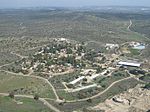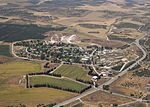Bayt Jibrin or Beit Jibrin (Arabic: بيت جبرين; Hebrew: בית גוברין, romanized: Beit Gubrin), known between 200-400 CE as Eleutheropolis (Greek, Ἐλευθερόπολις, "Free City"; Arabic: إليوثيروبوليس), was a historical town, located in central Israel near the 1949 ceasefire line, 21 kilometres (13 mi) northwest of the city of Hebron. Abandoned in 1948, the town had a total land area of 56,185 dunams or 56.1 km2 (13,900 acres), of which 0.28 km2 (69 acres) were built-up while the rest remained farmland.During the 8th century BCE, the nearby village of Maresha was part of the Kingdom of Judah. During the days of Herod the Great, a Jewish ruler of the Herodian Kingdom, the town was the administrative center for the district of Idumea. After the turmoil of the First Jewish–Roman War and the Bar Kokhba revolt, the town became a thriving Roman colony and a major administrative centre of the Roman Empire under the name of Eleutheropolis. Eleutheropolis became one of the most important cities in the Roman province of Syria Palaestina. The city was then inhabited by Jews, Christians and pagans. Under the British Mandate of Palestine, Bayt Jibrin again served as a district centre for surrounding villages. It was captured by Jewish forces during the 1948 Arab–Israeli War, causing its Arab inhabitants to flee eastward. Today, many of the Palestinian refugees of Bayt Jibrin and their descendants live in the camps of Bayt Jibrin (ʽAzza) and Fawwar in the southern West Bank.
The kibbutz of Beit Guvrin was established to the north of Bayt Jibrin, on the villages' lands, in 1949. The archaeological sites of Maresha and Beit Guvrin, including their ancient burial caves, are today an Israeli national park known as Beit Guvrin National Park. It is also a UNESCO World Heritage Site. Eleutheropolis remains a titular see in the Roman Catholic Church.











